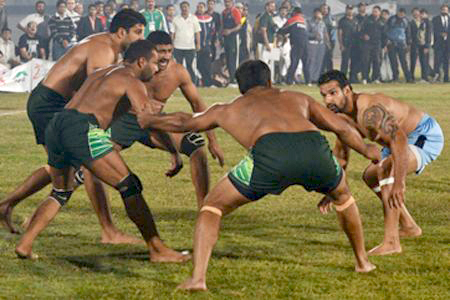
Ludhiana, December 16: Indian men's kabaddi team put in a stellar performance as they literally thrashed archrivals Pakistan 59-22 in the finals of the 3rd Kabaddi World Cup, to retain their title at the Guru Nanak stadium, here on Saturday.
The Indian boys led by Sukhbir Sarwan brought their A-game in the final match and didn't allow their opponents to settle and put the green brigade under the coch right from the word go.
Such was India's dominance that the Indian team didn't allow the Pakistani team to score even a single point in the first 15 minutes of the match. India raced onto a 9-0 lead and only after that did Pakistan open their scoring.
It seemed that the Pakistani team was somewhat nervous in the opening minutes of the encounter as the Indians took full advantage of their indecisiveness.
Indian captain Sukhbir Sarwan was in top-notch form as India led the first quarter by 18-2, in which most points were scored by the skipper himself. By the interval, India was infront by 33-9.
The second quarter of the first half saw India score 15 points while Pakistan did improve marginally to score 7 points, but, India dominated the opening half thoroughly.
After a brief interval, the second half had both teams fight tooth and nail, as Pakistan showed a much improved performance.
The first quarter of the second half saw Pakistan score 6 points but India managed 14 points and consolidated their lead to 47-15, by the end of the first quarter of the second half.
The second quarter of the second half was once again a close affair as India scored 12 points and played safe, while Pakistan scored 7 points. Finally, the men's team emerged victorious by a margin of 59-22.
The first half score was 33-9, while the second half score was 26-13 in favour of the Indian team.
The Indian team got richer by handsome prize money of Rs 2 crore, which was more than double that they got in the second edition of the Kabbadi World Cup whereas the Pakistani team got Rs 1 crore for bagging the runners-up position.
The Canadian team which finished third got Rs 51 lakhs for their feat. The 15-day long tournament saw 16 nations participating and has propelled Kabaddi onto the international map as it won't be long that the game might be included in Olympics too.





Comments
Add new comment